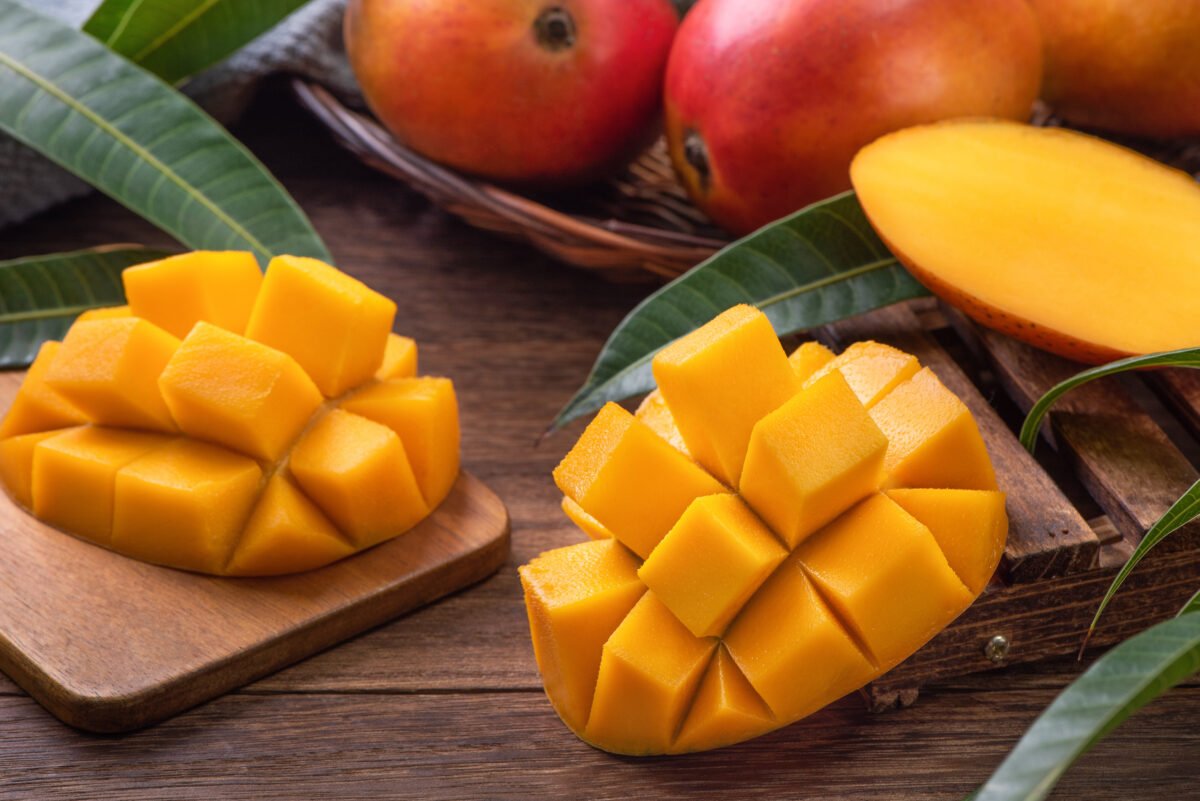The Magnificent Mango

The mango (Mangifera indica), a member of the cashew family, originated in the Himalayan foothills of India more than 5000 years ago. The mango has been prized in indigenous medicine for its myriad healing properties. All parts of the mango including leaves, bark, flesh, peel, roots, and flowers have pharmacological potential. There are more than 300 different varieties of mangos in the world.
Benefits of Mango
Phytonutrients are substances produced by plants to protect themselves. They include carotenoids, flavonoids, coumarin, and indols. Many are bioactive compounds known to promote human health and manage chronic diseases. Their properties include anticancer, antioxidant, anti-inflammatory, antibacterial, and antiviral.
These compounds play an essential role in addressing the increasing prevalence of metabolic syndrome—a cluster of risk factors associated with the development of heart disease, heart failure, stroke, and diabetes. Nearly one in three Americans have metabolic syndrome, stated Dr. Chiadi E. Ndumele, a cardiologist at Johns Hopkins.
Mangos and the Heart
According to the American Heart Association, this juicy fruit’s fiber, vitamin, potassium, and magnesium content help reduce the risk of heart disease, including blood pressure and pulse regulation. Mangiferin, a potent antioxidant found in high concentrations in the leaves, is linked with reduced heart inflammation.
Mangos are also rich in vitamins C and K. Vitamin C helps in blood vessel maintenance and iron absorption, while vitamin K, essential in prothrombin generation, is vital for the formation of blood clots.
Mangos and Cancer
Mangos are rich in beta-carotene, a pigment responsible for its bright, yellow-orange color. Beta-carotene is an antioxidant known to fight cell-damaging free radicals that can potentially lead to cancer.
According to a study in the Journal of Lipids, published in 2017, mangiferin protects against a variety of human cancers, including lung, colon, and breast, by suppressing tumor necrosis.
Studies suggest that mango extracts containing phytochemicals inhibit breast cancer cell growth, proliferation, migration, and invasion. More research and clinical studies are needed to explore its potential as a therapeutic agent.
Mangos and Brain Health
Mangiferin has been shown to improve long-term object recognition memory in rats. Scientists feel this has the potential for preventative and therapeutic use in memory impairment diseases, such as schizophrenia, dementia, amnesia, and Alzheimer’s.
The vitamin B6 in mangos may help with brain function by lowering high levels of the chemical homocysteine which is linked to a higher incidence of dementia, Alzheimer’s, and cognitive decline, according to the Harvard School of Public Health.
Mangos and Weight Loss
In addition to being low in fat, mangoes can aid in weight loss because their rich fiber content helps to promote the sensation of satiety. One study reported that mangiferin protected rats against weight gain from a high-fat diet and improved glucose and insulin responses, thus lowering the risk of obesity.
Mangos and Gut Microbiome
The fiber and water in mangos can help stabilize your digestive system, thus preventing constipation and reducing the risk of colon and rectal cancer. In a recent study published in the journal Food Science and Nutrition 2023 researchers at San Diego State University investigated how consuming fresh mango affects gut health and the microbiome by increasing the population of certain important gut bacteria.
Mangos, The ‘Love Fruit’
For centuries, Chinese and Ayurvedic medicine have recommended mangos for their natural aphrodisiac qualities. Known as the “love fruit,” the vitamin E in mangos helps regulate sex hormones and boost sex drive. The mango leaf’s polyphenols are linked to both women’s and men’s reproductive health.
Mangos and Sleep Quality
When eaten at night, mangoes help improve your sleep quality. Mangoes are rich in vitamin B6, which stimulates serotonin to produce melatonin, the sleep hormone. A high concentration of tryptophan, an amino acid that converts to serotonin, makes mangos a happy fruit while being a precursor to melatonin. Mango’s high magnesium content has been linked to helping combat insomnia.
Mangos and Skin Health
In addition to vitamins A and E, vitamin C helps the skin’s natural aging process by shielding it from UV rays and pollution impurities. Vitamin C also promotes collagen production, allowing the skin to maintain elasticity. Potent antioxidants in mangos inactivate the free radicals known to damage skin.
Nutritional Qualities
According to the U.S. Department of Agriculture’s FoodData Central published in April 2019, one medium-sized mango contains:
Calories: 202
Protein: 3 grams
Cholesterol: 0
Carbohydrates: 50 grams
Fiber: 5 grams
Sugar: 45 grams
Vitamin A: 3630 IU
Vitamin C: 122 milligrams
Potassium: 564 milligrams
Magnesium: 34 milligrams
Tryptophan: 44 milligrams
Mango Skin–Handle With Care
Mango skin contains a compound called urushiol, an oil that can cause the skin to erupt in rashes in some people. The oil is found in the leaves, stems, roots, and skin, particularly around the stem. Before peeling a mango, it is wise to wash and lightly scrub the skin in warm water.
Tips for Eating Mangos
- To obtain the best nutritional qualities, flavor, and taste, eat tropical fruit fresh and raw.
- If you are eating dried mango, keep in mind that drying fruit concentrates the sugar content.
- Though mango skin is edible it has a strong bitter flavor and is difficult to chew and digest, thus the nutrients you would derive from the skin may be found in other tropical fruits.
- Keep mangos at room temperature and eat them in their prime as overripe fruit loses much of its nutritional value and disease-fighting qualities soon after picking.
- Eating mangoes can be very messy—or an art form—here’s a neat and easy way to enjoy your mango!




